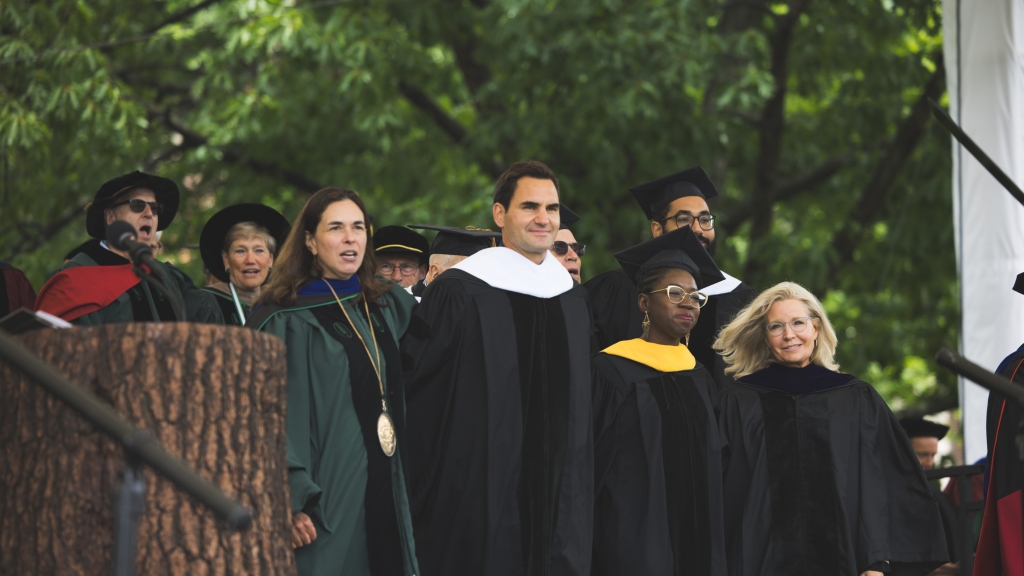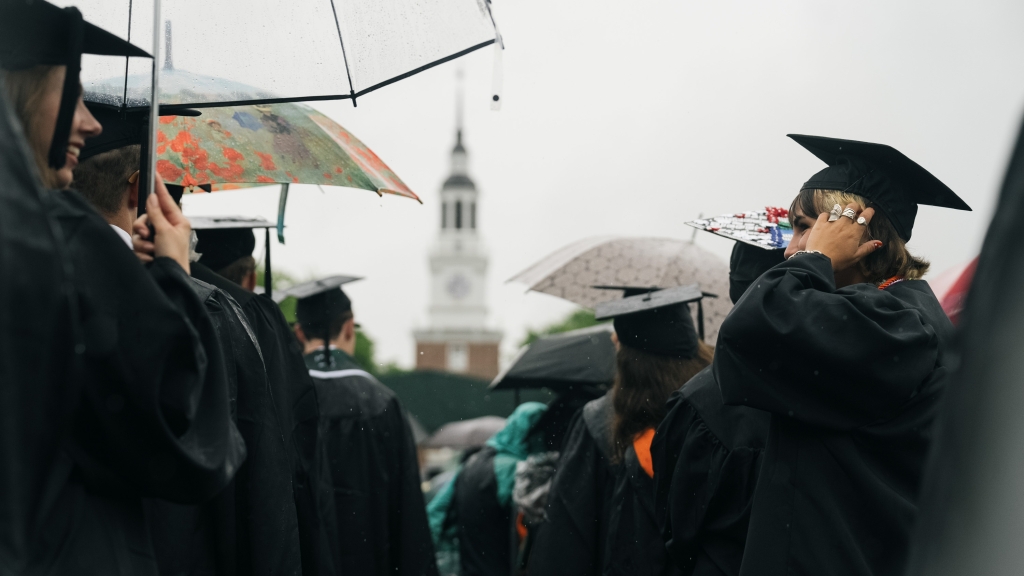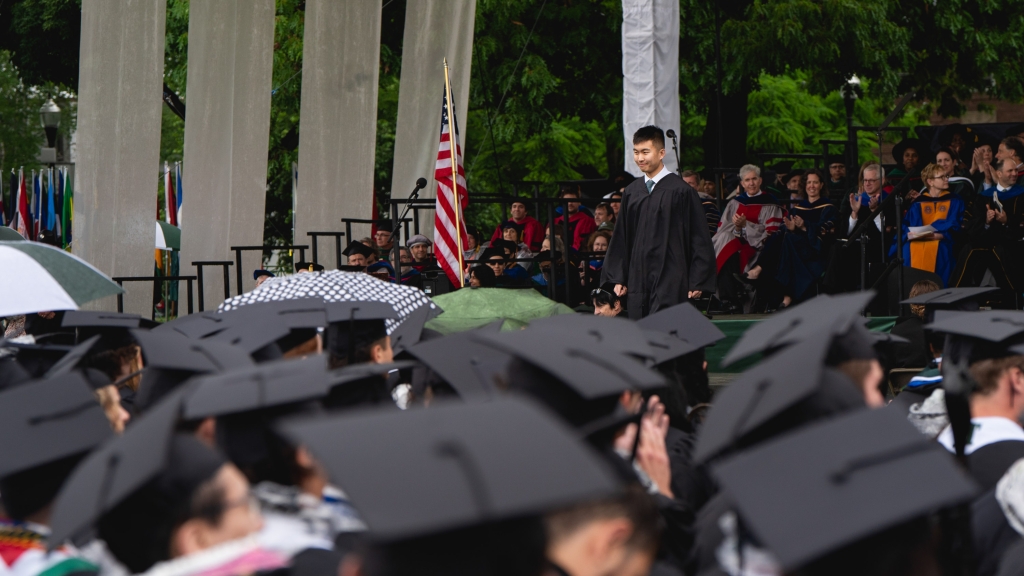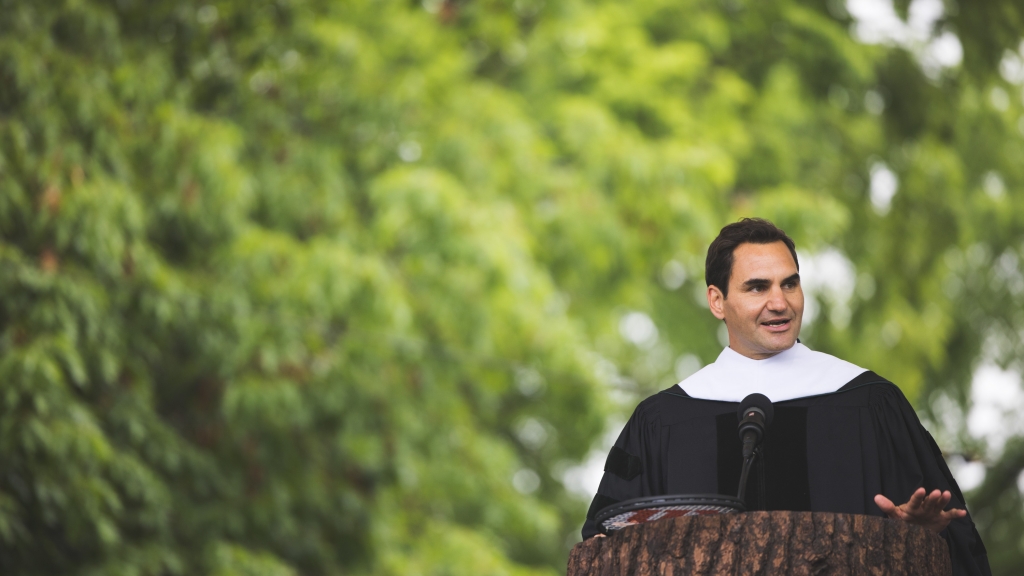Members of the Class of 2024 first arrived on campus during the COVID-19 pandemic, then lived and learned through politically turbulent times, showing extraordinary resilience over the past four years.
On Commencement Day, they managed to celebrate their achievements in front of an audience of 11,000 who weathered a rainy morning to share the moment with them and also hear from tennis great Roger Federer. Another 7,700 watched on the livestream on Sunday.
Dartmouth conferred more than 1,150 degrees to undergraduates from 49 states, Puerto Rico, Washington, D.C., and 42 other countries, and 902 graduate or professional degrees. And Federer, an eight-time Wimbledon champion and philanthropist, served up what he called three "tennis lessons," applying his time-tested sports philosophy broadly to life's most daunting challenges.
First, "‘Effortless' is a myth. People would say my play was effortless," said Federer, who was known for his graceful style on court. In fact, Federer said he worked hard to perfect his technique and be patient and disciplined and is proudest of victories he earned when the competition became fierce.
“Because they prove that you can win not just when you are at your best, but especially when you aren’t. Most of the time it's not about having a gift. It’s about having grit.”
Federer's second lesson: perfection is impossible. "In the 1,526 singles matches I played in my career, I won almost 80% of those matches." Yet he won only 54% of the points he played.
"When you're playing a point, it is the most important thing in the world," he explained. "But the truth is, whatever game you play in life, sometimes you're going to lose. A point, a match, a season, a job: it's a roller coaster, with many ups and downs."
Third, Federer reminded the audience, the world is much bigger than a tennis court.
"Even when I was in the top five, it was important to me to have a rewarding life, full of travel, culture, friendships, and especially family," he said.

President Sian Leah Beilock sings the Alma Mater at Commencement. Standing next to her were Commencement speaker Roger Federer, Joy Buolamwini, John Urschel, and Liz Cheney, all of whom received honorary degrees. (Photo By Katie Lenhart)
Motivated by his mother, Federer, who holds dual citizenship in Switzerland and South Africa, started a foundation when he was only 22 to empower children through education, and it has enabled nearly 3 million children in Switzerland and six countries in southern Africa to get a quality education and helped to train more than 55,000 teachers.
"It's been an honor—and it's been humbling," he said.
Beginning his professional tennis career at 16, Federer never attended college, and he said receiving a Doctor of Humane Letters degree from Dartmouth was his "most unexpected victory ever."
In addition to Federer, President Sian Leah Beilock presented honorary degrees to:
- Joy Buolamwini, founder of Algorithmic Justice League, author of Unmasking AI;
- Former U.S. Rep. Liz Cheney;
- Mung Chiang, president of Purdue University;
- Mira Murati, Thayer '12, chief technology officer, OpenAI;
- Paul Nakasone, retired general and former director of the National Security Agency;
- Richard Ranger '74, a member of the class celebrating its 50th reunion;
- John Urschel, assistant professor of mathematics, Massachusetts Institute of Technology, and former NFL player;
- Roy Vagelos, retired chairman and CEO, Merck & Co. Inc.
President Beilock on "finding joy"
In her valedictory address, President Beilock urged graduates to find joy, even in trying times.
"One thing I hope you have learned at Dartmouth is not to seek out the one, irrefutable truth," she said. "Remember the humanity of your colleagues, friends, neighbors, and understand their points of view, even when they're in sharp opposition to your own. Understand the massive challenges our country and our world face right now, while not letting those challenges overwhelm you, every waking hour of the day. And know that even in moments of great difficulty, it is still OK to find joy, and encourage others to do the same."

The graduates, and Baker Tower, stood firm in the rain. (Photo By Eli Burakian '00)
Urging students to understand and learn from history, Beilock noted a "new Commencement tradition here today, as we incorporated the Wampum Belt, given to Dartmouth by the Mohegan Tribe, for the first time in our Commencement procession this morning."
A reminder of the "long and complicated relations between Dartmouth and the Mohegan Tribe and Indian Country," Beilock said the belt's purple beads signify conflict, while its white beads signify cleansing.
"The belt is, in its own way, a treaty: signifying a promise to honor our commitment to the Tribe and the Indigenous peoples of this land. It also reminds us that mutual respect is born through an unwavering dedication to meaningful dialogue. It symbolizes the importance of trying to understand where the other side is coming from, and learning from each other."
Student speakers
Dartmouth's history as an institution founded to educate Native Americans was also the focus of the welcoming remarks by Raylen Bark '24 and Paige Nakai '24, co-presidents of Native Americans at Dartmouth. "It's a diversity of Indigenous knowledge and background that truly makes Dartmouth, as we and this institution embark on our next chapters," said Nakai.
Valedictorian Brian Zheng '24, who on Saturday was commissioned as second lieutenant in the Army, drew inspiration from his favorite poem, Robert Frost's Stopping By Woods on a Snowy Evening.
"Every time I read that poem, I can't help but think of the Dartmouth Class of 2024," he said. "When we arrived on campus in the fall of 2020, amidst a global pandemic, it truly did not matter who you were or where you came from. You could have been me, a child of immigrants whose middle name, Haixiang, literally translates to 'flying across the ocean.' Or you could have been someone who spent their entire life in the Upper Valley before coming to Dartmouth. The important thing was that you chose to spend your time here, in these woods, with these people, for at least a couple of snowy evenings."

Valedictorian Brian Zheng '24 said, "Our passion, our caring, our drive, will and must propel us to lift up those around us and to lend a hand to those in need." (Photo By Julia Levine '23)
With curiosity "gained in the woods," Zheng predicted that "our passion, our caring, our drive, will and must propel us to lift up those around us and to lend a hand to those in need."
The ceremony included sporadic protests from pro-Palestinian and graduate student-union supporters, with some students walking out during the three-hour ceremony. But for the most part, Commencement 2024 was marked by age-old traditions, ending with the singing of the Alma Mater as students gathered with friends and families near the Green.
Among them: Lexi Dewire '24, a captain of the women's tennis team. She loved Federer's speech.
"I think the part that resonated with me the most was when he said, out of all the things he's accomplished, he's only won about 54% of all the points in all of his matches," Dewire said. "You're going to lose a lot. You can't win everything, and each particular point doesn't matter. It's the whole match and the whole adventure. It's not always going to be clean and easy and beautiful, but it's the outcome that's important, and whether you accomplish what you need to accomplish, no matter what you went through or how you got there."
